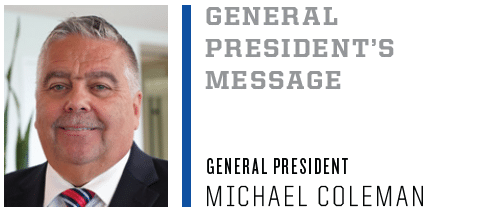As SMART workers, many of us have direct experience with the tactic known as “divide and conquer.”

Anyone who’s been part of an organizing campaign knows what I’m talking about. Bad-faith employers, rather than respecting their employees’ decision to join our union, will try to divide workers against one another. They try to split organizing workers apart so they forget their common ground — the reason they’re organizing — and, as a result, lose the chance to collectively bargain.
We sometimes see it during contract negotiations, too. I know it happened recently for our SMART-TD railroaders working for the Alabama Port Authority, but it can also take place in production shops, when bargaining first contracts with newly organized contractors, and beyond. Rather than bargain in good faith, employers will try to exploit our differences — whether it’s seniority, what language we’re most comfortable speaking, pay differences in previous contracts, you name it — to try to break our unity and win an agreement that doesn’t give members what they deserve.
SMART-TD Local 598 members in Alabama refused to be divided based on previously existing pay structures, winning a strong agreement that benefited everyone. And that’s the example every single one of us should follow: on the job, at the bargaining table and in everyday life.
Because brothers and sisters, I believe we are facing constant attempts to divide us — and to conquer our union.
The truth is, when we bargain collectively, we are a pain in the ass for the rich, the powerful, the greedy corporations of the world. Why? Because together, we are stronger. Together, we win contracts that allow our families not just to get by, but to thrive. Together, we achieve real political victories, like the Federal Railroad Administration’s two-person crew rule. Together, we force the hand of transit companies, working to get real change on our buses and passenger trains, not just lip service.
The rich and powerful — the one percent — they don’t like that. Because enough is never enough for them. They need more wealth, more shares, more profit. And so they work overtime to try to destroy our movement.
The ways they try to do that take many forms, including the recently passed spending bill in the United States, which will drive up our health care costs, cancel construction projects and take from our neighbors who are struggling to get by, all while benefiting the richest people in the country. But the playbook they rely on the most is, you guessed it, divide and conquer.
These people will do everything they can, using all their money and influence, to try to make us afraid of each other. They want us to be scared of our neighbors, our fellow workers — hell, even our SMART brothers and sisters — based on all kinds of arbitrary categories. Race, gender, what we believe in, where we were born, etc. We’re all familiar with it.
And of course, we do have differences.
But it doesn’t matter who you voted for, what language you speak best, what you like to do in your free time. We all have so much more in common with each other than we ever will with the billionaires who dominate our news feeds.
Our solidarity is our power, brothers and sisters. And in the fight for our jobs, our families and our future, it’s OUR power, our unity, that matters the most.
As your union brother, I urge all of us to keep sticking together as we move forward.
In solidarity,

SMART General President Michael Coleman
Related News
- GP Coleman on latest round of job cancellations
- Department of Transportation cancels more than $300 million in funding for Mass. megaproject
- Canceled Cleveland-Cliffs project leads to lost jobs for Dayton-area construction workers
- 2025 spending bill will cut jobs, drive up costs for SMART members nationwide
- General President Coleman’s statement on White House budget office encouraging the use of project labor agreements
- Cuts to tax credits and infrastructure funding threaten SMART jobs: GP Coleman’s statement
- Defending our rights: Fighting for Kilmar Abrego Garcia and his right to due process